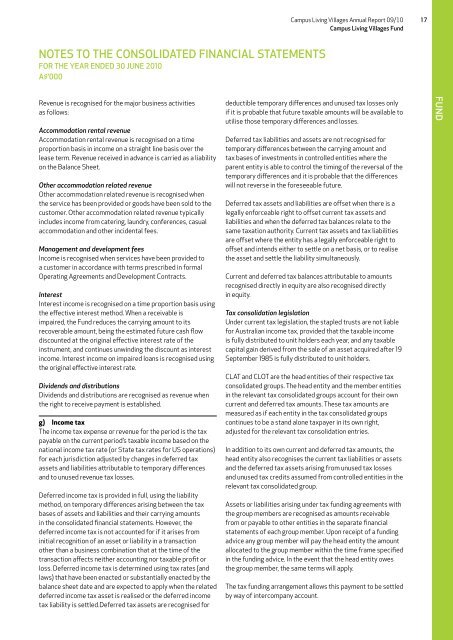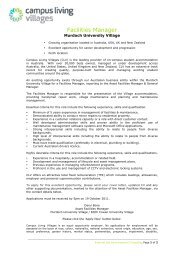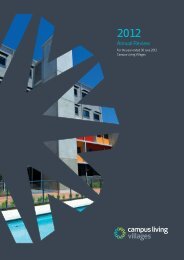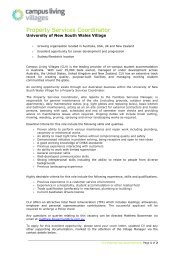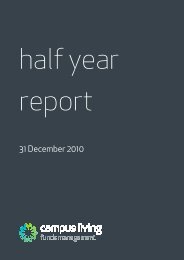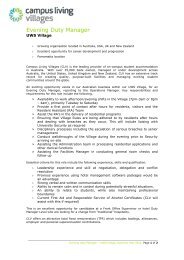Annual Report - Campus Living Villages
Annual Report - Campus Living Villages
Annual Report - Campus Living Villages
You also want an ePaper? Increase the reach of your titles
YUMPU automatically turns print PDFs into web optimized ePapers that Google loves.
<strong>Campus</strong> <strong>Living</strong> <strong>Villages</strong> <strong>Annual</strong> <strong>Report</strong> 09/10 1 7<br />
<strong>Campus</strong> <strong>Living</strong> <strong>Villages</strong> Fund<br />
NOTES TO THE CONSOLIDATED FINANCIAL STATEMENTS<br />
FOR THE YEAR ENDED 30 JUNE 2010<br />
A$’000<br />
Revenue is recognised for the major business activities<br />
as follows:<br />
Accommodation rental revenue<br />
Accommodation rental revenue is recognised on a time<br />
proportion basis in income on a straight line basis over the<br />
lease term. Revenue received in advance is carried as a liability<br />
on the Balance Sheet.<br />
Other accommodation related revenue<br />
Other accommodation related revenue is recognised when<br />
the service has been provided or goods have been sold to the<br />
customer. Other accommodation related revenue typically<br />
includes income from catering, laundry, conferences, casual<br />
accommodation and other incidental fees.<br />
Management and development fees<br />
Income is recognised when services have been provided to<br />
a customer in accordance with terms prescribed in formal<br />
Operating Agreements and Development Contracts.<br />
Interest<br />
Interest income is recognised on a time proportion basis using<br />
the effective interest method. When a receivable is<br />
impaired, the Fund reduces the carrying amount to its<br />
recoverable amount, being the estimated future cash flow<br />
discounted at the original effective interest rate of the<br />
instrument, and continues unwinding the discount as interest<br />
income. Interest income on impaired loans is recognised using<br />
the original effective interest rate.<br />
Dividends and distributions<br />
Dividends and distributions are recognised as revenue when<br />
the right to receive payment is established.<br />
g) Income tax<br />
The income tax expense or revenue for the period is the tax<br />
payable on the current period’s taxable income based on the<br />
national income tax rate (or State tax rates for US operations)<br />
for each jurisdiction adjusted by changes in deferred tax<br />
assets and liabilities attributable to temporary differences<br />
and to unused revenue tax losses.<br />
Deferred income tax is provided in full, using the liability<br />
method, on temporary differences arising between the tax<br />
bases of assets and liabilities and their carrying amounts<br />
in the consolidated financial statements. However, the<br />
deferred income tax is not accounted for if it arises from<br />
initial recognition of an asset or liability in a transaction<br />
other than a business combination that at the time of the<br />
transaction affects neither accounting nor taxable profit or<br />
loss. Deferred income tax is determined using tax rates (and<br />
laws) that have been enacted or substantially enacted by the<br />
balance sheet date and are expected to apply when the related<br />
deferred income tax asset is realised or the deferred income<br />
tax liability is settled.Deferred tax assets are recognised for<br />
deductible temporary differences and unused tax losses only<br />
if it is probable that future taxable amounts will be available to<br />
utilise those temporary differences and losses.<br />
Deferred tax liabilities and assets are not recognised for<br />
temporary differences between the carrying amount and<br />
tax bases of investments in controlled entities where the<br />
parent entity is able to control the timing of the reversal of the<br />
temporary differences and it is probable that the differences<br />
will not reverse in the foreseeable future.<br />
Deferred tax assets and liabilities are offset when there is a<br />
legally enforceable right to offset current tax assets and<br />
liabilities and when the deferred tax balances relate to the<br />
same taxation authority. Current tax assets and tax liabilities<br />
are offset where the entity has a legally enforceable right to<br />
offset and intends either to settle on a net basis, or to realise<br />
the asset and settle the liability simultaneously.<br />
Current and deferred tax balances attributable to amounts<br />
recognised directly in equity are also recognised directly<br />
in equity.<br />
Tax consolidation legislation<br />
Under current tax legislation, the stapled trusts are not liable<br />
for Australian income tax, provided that the taxable income<br />
is fully distributed to unit holders each year, and any taxable<br />
capital gain derived from the sale of an asset acquired after 19<br />
September 1985 is fully distributed to unit holders.<br />
CLAT and CLOT are the head entities of their respective tax<br />
consolidated groups. The head entity and the member entities<br />
in the relevant tax consolidated groups account for their own<br />
current and deferred tax amounts. These tax amounts are<br />
measured as if each entity in the tax consolidated groups<br />
continues to be a stand alone taxpayer in its own right,<br />
adjusted for the relevant tax consolidation entries.<br />
In addition to its own current and deferred tax amounts, the<br />
head entity also recognises the current tax liabilities or assets<br />
and the deferred tax assets arising from unused tax losses<br />
and unused tax credits assumed from controlled entities in the<br />
relevant tax consolidated group.<br />
Assets or liabilities arising under tax funding agreements with<br />
the group members are recognised as amounts receivable<br />
from or payable to other entities in the separate financial<br />
statements of each group member. Upon receipt of a funding<br />
advice any group member will pay the head entity the amount<br />
allocated to the group member within the time frame specified<br />
in the funding advice. In the event that the head entity owes<br />
the group member, the same terms will apply.<br />
The tax funding arrangement allows this payment to be settled<br />
by way of intercompany account.<br />
FUND


